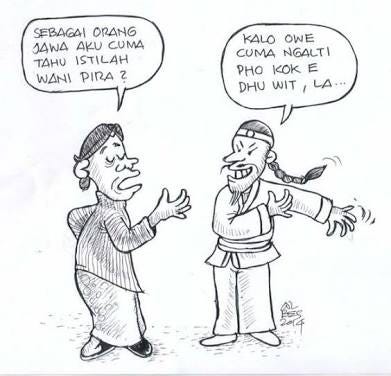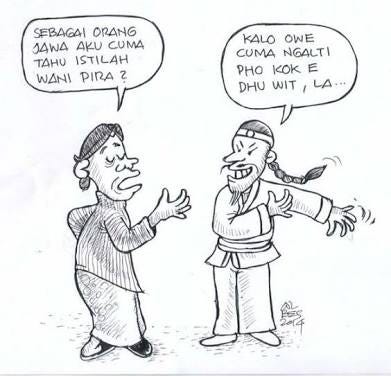It's 19th of July 2017, 20:42 PM. I just went home from Bandung Electronic Center and then i decide to fetch a taxi to back to Ciumbuleuit, this driver apparently is sundanese from his accent and words spoken, then again he is a fairly nice guy, he talked to me politely about his routines as a taxi driver, how he will start from Cimahi and then wait for customers in front of Bandung Electronic Center 'till night. When we talked about traffic in Bandung, especially about the crowded Cipaganti road, he mentioned that he hated on-line taxi drivers, mainly the chinese-indonesian whom he perceived as "...already rich people,..
why don't they give thanks to God for all they have and just stop being so greedy by taking our little income !?", when i asked him does he hate chinese-indonesians? He mentioned that yes, he does because chinese-indonesians are taking over the economy of Indonesia from the locals. As a chinese-indonesian myself, i felt very lucky that the driver doesn't acknowledge my heritage and ethnicity that night, he stares at me with relaxed stare in his eyes, he felt that he is comfortable to bash the chinese-indonesians with me because in his mind, i am not a chinese-indonesian.
That was a very interesting and also intense night in my life, how do you feel if you are present next to a stranger who you know hates you ? i mean i do kind of scared when he passionately tell that all chinese-indonesians are greedy and evil (albeit in polite mannerism) but i wish he soon find out that there are many chinese-indonesians that are suffering in poverty, many of them are living in hardships, in slums and poor districts that are,.. you know..not rich. But that night i am stroke by a thought : a theory that may explain the discord between the "pribumi"/ "locals" and the "tionghoa"/ "chinese-indonesians" and why the hatred lives on today especially in the stereotypes they attribute to each other.
The stereotype is that the chinese-indonesians are greedy and workaholic on the other side the native indonesians are lazy, laid back and slow.
Let's break this down : back way in the past, mainly in the colonial era when the Dutch (netherlands) still control this country, the native indonesians (mainly java island inhabitants) are mostly agricultural based society, and agricultural society has seasonal work period, for example a peasant plant the seed in certain month and then work the fields and then gather the crops, then for a couple of months they can rest and then enjoy the crop they have planted months ago,
their lives can be sustained without much work in the fields (at least normatively) because nature will grow the plants, animals need time to breed and it's out of their control so they can have many rest , also their work is quite hard and tiring, they go to their fields, plant the seed and walk back home, sometimes that kind of activities can take them quite far from their houses and can be very tiresome with hills and valleys on their way which may also bond them as a society more because long walks usually means long talks and sharing between many fellow peasants and farmers which also a character of Indonesians.
On the other side, chinese-indonesians founs work as either factory workers or like the most of them like to do : become a merchant and trade goods. The chinese indonesians buy and sell things mostly by establish a store or a shop or in some cases restaurants this means that although work can be overload but they don't have to face physical obstacles like the farmers and peasants do, what the chinese merchants face however is constant competition and need constant oversight on logistics, income, workers salaries and also their share of profit.
This condition makes chinese-indonesians normatively need to work nearly everyday with little to no holiday with careful calculation and they became profit-oriented society of merchants with hard work ethics and diligence, competitiveness also make them have less of social bond with each other as they see another as a competitior or worse : a threat to his or her bussiness which because they are making a living from the bussiness they owned , they became so dependant on the bussiness and the threat to their bussiness became a threat to themselves as they perceived.
Now compare the two characteristics i gave you, can you place yourself in both of the perspectives? I am sure if you are capable to see through these two different perspectives you will understand. First, chinese-indonesians may perceive the natives as "lazy" because they don't work as roughly or as diligent because they have more spare time which is actually (in my opinion) is normal as it is a part of their job. And also the constant competitiveness against the familial bond can cause misunderstanding where the natives perceive the chinese-indonesians as arrogant and only think about the bussiness or even in some cases, greedy.
For me, this theory makes sense because the lack of communication and immersion back in the collonial era. As we know, back in the day we can assume that children will inherit their parent's profession, a son of a merchant will most likely be a merchant, a child of a farmer will likely also be a farmer because they inherit real private-owned properties of their family so this mindset is inherited from the older generations to the younger generations which can explain why in the year 2017 there's still be a piece of this ancient mindset that potentially break our unity apart.







